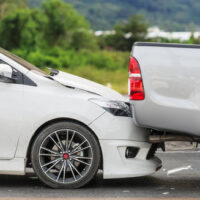Who is Presumed to be Negligent in a Rear-End Car Crash?

Rear-end accidents are a common sight in Florida and across the nation. In fact, the National Highway Traffic Safety Administration (NHTSA) estimates that rear-end collisions make up as many as one-third of all car accidents. Although many of these types of car crashes occur at low speeds and cause little damage, they still result in thousands of injuries every year, so if you were injured in a rear-end collision, it is critical to speak with an experienced Florida car accident attorney who can help you seek compensation for your medical bills and other losses.
Presumption of Negligence
Before an injured party can collect compensation for injuries sustained in a car crash, he or she must be able to demonstrate that another party was at fault. However, rear-end car accidents that occur in Florida are unique in that the rear driver is always presumed to be negligent, or at fault for causing the crash. This is largely based on the belief that:
- Rear drivers are in a better position to see what happened ahead and so are also better prepared to investigate the crash; and
- Rear drivers have a duty to operate their vehicles in a reasonably safe manner and to avoid collisions with forward objects.
Overcoming a Presumption of Negligence
Fortunately, drivers can overcome this presumption by providing evidence that:
- Contradicts the plaintiff’s description of the crash; or
- The crash could not be avoided.
Rear drivers who cannot provide evidence supporting either one of these assertions will be found at fault for the collision and so will be required to pay resulting damages. However, rear drivers who do meet this standard will have the opportunity to present their version of the events at trial, after which a jury will return a verdict. Evidence that could help exonerate the rear driver include:
- Proof that a road hazard or poor weather conditions made avoiding the accident impossible;
- Proof that the lead driver made an illegal or improper stop; or
- Proof that the lead driver suddenly and inexplicably stopped or made a sudden, dangerous lane change.
This type of evidence may be enough to convince a court that a rear driver was not necessarily at fault for causing a crash and so is not automatically liable for damages. Even in these cases, the rear driver will still need to go to court and prove to a jury that the other party was the primary cause of the crash, unless the parties are able to reach an out-of-court settlement.
Contact an Experienced Car Accident Attorney About Your Case Today
The presumption of negligence is a critical issue in rear-end collision cases, as the party deemed responsible will be on the hook for a wide range of damages, which could include compensation for medical expenses, lost wages, property damage, and pain and suffering. If you were involved in a rear-end car crash in Fort Lauderdale, please don’t hesitate to call Boone & Davis at 954-566-9919 to discuss your case with a dedicated car accident attorney.
Resource:
one.nhtsa.gov/nhtsa/Safety1nNum3ers/august2015/S1N_Aug15_Speeding_2.html
